
February-
March 2016
More Than Money
------------------
|






Fourth and Inches
The Life and Redemption of Troy Sadowski
The 1997 AFC championship game between the Pittsburgh Steelers and the Denver Broncos came down to a single play. On the opening drive of the second half, after driving the length of the field, Steelers’ quarterback Kordell Stewart threw an interception in the endzone to Broncos’ linebacker Allan Aldridge. The Steelers never recovered from the turnover, and Denver slipped out of Three Rivers Stadium with a 24-21 victory. Two weeks later, the Broncos hoisted the Vince Lombardi trophy after winning Superbowl XXXII easily over the Green Bay Packers.
That moment, that game, is seared into Troy Sadowski’s memory. “I will never forget pre-game, the jitters, the Terrible Towels, the chants of ‘Here we go, Steelers! Here we go!’ and the stomp of more than 65,000 feet. It sounded like thunder as we ran up the tunnel. You could feel the excitement. And then to lose that way…that memory hurt a lot longer than the finger I broke during the second quarter. It was my shot to get to the Big Game…and I missed it.”
That goal-line interception is the most vivid NFL memory for the six-foot five, 250-pound tight end who spent nine seasons in the League, playing for six teams: the Jaguars, Steelers, Bengals, Jets, Chiefs, and Falcons. It was a long run in the pros by anyone’s standards.
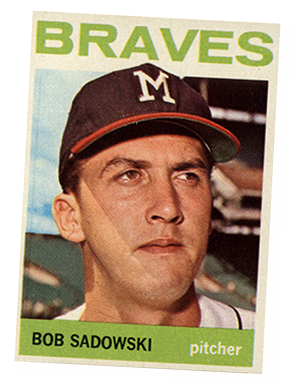 Major League Dad...and Mom Major League Dad...and Mom
Troy was born and raised in the Atlanta area, and his family was anything but typical. His dad was the youngest of ten siblings, from a family of Polish immigrants who came through Ellis Island and landed in Pittsburgh (eventually becoming big Steelers fans). “My grandfather died when my dad was young, and I only remember my grandmother as a sweet, old lady who spoke few words of English; the one I heard most was ‘Eat!’”
Troy’s dad Robert (Bob, pictured right) escaped the steel mills by becoming a Major League pitcher. He played for the Milwaukee Braves and the Boston Red Sox and holds the distinction of being the last Braves starting pitcher at their final home opener in Milwaukee, defeating the Chicago Cubs 5–1. After his career in the Majors ended in 1966, Robert moved the family to Atlanta, reconnecting with former Braves teammates.
“It was pretty incredible to have a Major League dad,” Troy recalls. “He was my coach for football, baseball, and basketball all the way through high school. Some of my sweetest memories from childhood are going to the ballfield with a trashcan full of baseballs. Dad would pitch the entire bucket then sit and watch while I picked them all up.
“My first time at bat, I remember thinking, ‘This guy is a Major League pitcher…what if he hits me?’ So, I backed away from the plate. My dad immediately said, ‘Get back in there!’ He threw one high and tight and hit me right in the back—on purpose. I remember him smiling and saying, ‘See, that wasn’t so bad, was it?’
“I still have pictures of my dad and me with Hank Aaron and other stars of the Atlanta Braves. Dad and I were really close, and he poured all of his sports knowledge and love of the game into me.”
Troy’s dad was not the only athlete in the family, though. His mom was a fine athlete as well, and when his dad couldn’t make it to a game, she would step in and coach the team. “The truth is,” Troy admits, “Mom was way harder on me than dad ever was.”
Troy’s mom was the glue that held the family together, so it was a devastating blow for Troy when she was diagnosed with breast cancer during his sophomore year in high school. She fought a valiant four-year battle against the disease before succumbing to its effects in 1986.
Watching his mother’s struggle with her illness was tough for Troy, and ultimately decided where he played college ball. He chose University of Georgia to be close to her, and where she could come and watch him play. Sadly, his mother never had opportunity to attend one of his college games.
Fourth and Inches
On the field, all was well…great, in fact! Troy became a four-year starter—a star at University of Georgia. He recalls his first game, the Georgia-Alabama game “between the hedges” in 1985, shown on national television. “What a terrible way to start my college football career. I remember running onto the field and being scared to death. I simply focused on blocking Cornelius Bennett (future five-time NFL Pro-Bowler and AFC Defensive Player of the Year). Somehow, I got through the game.”
Troy quickly became known for physical play and exceptional run blocking. He achieved All-American status, attracting the attention of pro scouts and becoming one of the greatest tight ends in UGA’s storied football history, according to most sports writers.
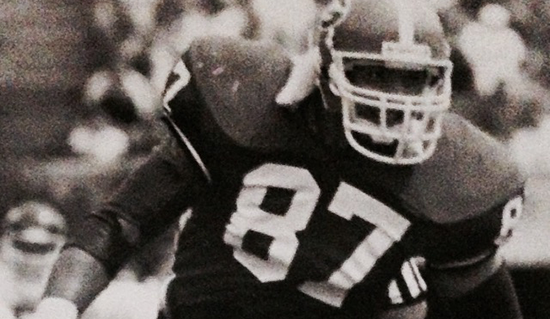
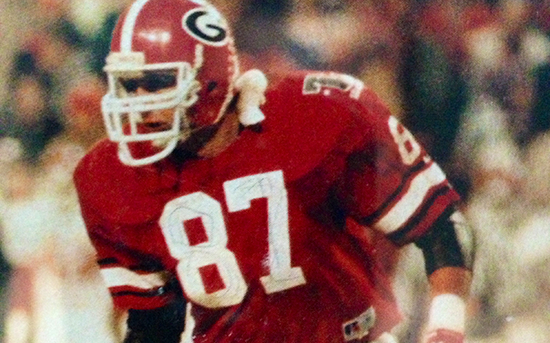
Photos: Troy during his remarkable career at University of Georgia.
Off the field, Troy’s life was in a downward spiral. Religion had played little part in the lives of the Sadowski family. Roman Catholics by tradition, they attended mass only on occasion, usually major holidays. While Troy knew about Jesus, he did not know Jesus. Without a moral anchor, and without the steadying hand of his mother, his behavior quickly went downhill.
As the “big man on campus” at Georgia, he thought he had it all figured out. He began partying—drinking, drugs, women, you name it. “I bought into Satan’s lies hook, line, and sinker,” Troy confesses. Thankfully, God sent four men into his life who cared enough to share the gospel with him. He had four distinct opportunities to accept Christ—four downs, as Troy describes them.
First down. Jim Cagle, Troy’s high school football coach invited him to FCA (Fellowship of Christian Athletes) meetings at least a dozen times before Troy accepted. “Finally got tired of him asking me, so I went. Heard the gospel; ignored it. In one ear and out the other! I was a 16-year-old kid who knew everything. I didn’t need Jesus in my life.”
Second down. Charlie Whittemore, tight ends coach at University of Georgia invited Troy to church, and he went…but only to stay in the coach’s good graces. Visiting in his home, however, made a great impact on Troy, and for a second time, he heard the gospel. Again, at a crucial time in his life, he chose to ignore it.
He finished his college career, entered the NFL draft, and was selected in the sixth round by the Atlanta Falcons. A few months later, after becoming a free agent, Troy found himself playing on Sunday for the Cincinnati Bengals. By all appearances, his life was falling into place. He was married, with two beautiful little girls, and an NFL career on the rise. “On the field, everything was great. Off the field, I was a mess. The weaknesses of college only got worse with a bigger paycheck. I never let it affect the way I played, but my lifestyle was tearing apart every other area of my life.”
Third Down. When Troy’s wife took his daughters to visit her parents in Atlanta and didn’t come back, something snapped. Troy began partying like never before, and while he did his best to hide it from his teammates, somehow, offensive lineman Ken Moyer knew. He repeatedly invited Troy to Bible study until, finally, he went. To his surprise, he found that kicker Doug Pelfry and quarterback David Klingler were also part of the group. “Those guys just loved on me,” Troy remembers. For the third time he encountered the gospel, but as low as he was, he chose to ignore it. He faced fourth down and inches from total disaster.
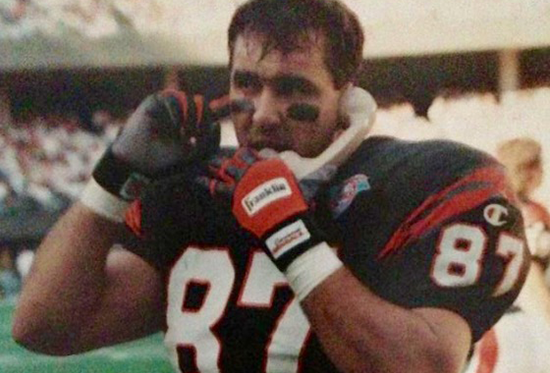
Photo: Troy
begins his NFL career with the Cincinnati Bengals.
Troy and his wife divorced in December 1998 as a result of his continual partying. Today, his relationship with his daughters remains strained. “I was coming apart,” Troy remembers, “and it was all my fault. I have no one to blame but myself for ruining my life…and theirs.”
Then, during the 1996 off-season, his friend Buddy Harris invited Troy to play church softball—a ringer for First Baptist Church, Woodstock, Georgia. “What a switch!” Troy laughs. “No alcohol, no women, no cursing, and everyone kept inviting me to church. Finally, I went. On my fourth visit, I knew it was time. I stepped out and headed to the altar where I met Pastor Johnny Hunt. He paired me up with an altar counselor named Vic Smith—six feet eight, 300 pounds—he couldn’t have done any better. Vic took me to a back room, and after a long, difficult conversation, I accepted Christ.”
It wasn’t just a first down for Troy; it was a whole new game. “These four men remind me of the guys who brought their crippled friend to Jesus. When they couldn’t get in the house, they climbed the wall. When they still couldn’t get in, they tore a hole in the roof, and lowered their buddy to Jesus. They did whatever it took. I’m so thankful they didn’t give up on me. And it is the same with Jesus—He never gives up. He loved me all the way through my pride and my partying, and He was ready and willing to forgive me when I finally got His message of grace through my thick skull at age 31.”
A New Game
Twenty years later, Troy has a new goal. Today, he works with Cornerstone Estate Planning and Free Will Baptist Foundation, dedicating his life to helping people plan for the future. His experience with the big money of the NFL has given him a unique perspective on wealth and possessions: “Sure, you get paid well, but remember that NFL stands for ‘Not For Long!’ I saved a lot of money, but as a result of my foolishness, I also went through a divorce that killed the portfolio. I was also dumb when it came to automobiles. Bigger, better…done. I went through $65,000 just flipping cars during my career.”
Thankfully, Troy was wise enough to invest in the NFL “second career” savings (retirement) plan, with the league matching his contributions. After 30 years, at age 55, he will be fully vested and begin drawing a pension.
With an average yearly salary of $325,000, Troy made more in his nine-year NFL career than most people do in a lifetime. Still, according to Troy, while the numbers may be bigger, the principles of stewardship are the same. “You have to plan ahead. So many people burn through their money without a plan and suddenly find themselves without anything. When it comes to money, you have to prepare…and not just for this life. You need to ask yourself, ‘Have I done everything I can to put my family in a good situation when they are grieving for me? Have I taken steps to continue supporting the ministries I love after I am gone?’”
The reality of death hit Troy in the face ten years ago, when he was diagnosed with cancer of the vocal chords. “The medical professionals asked about my will, my living will, my next of kin, and my heirs. I was terrified. I was a former NFL tight end, ten feet tall and bullet proof. Suddenly, I realized I wasn’t Superman after all. It changed my life. That’s how I got into estate planning, and today, I am quick to tell people that being prepared for death is one of the most important things in life.”
Finishing Strong
Ten years after his diagnosis, Troy is in good health and grateful for a new chapter in life. He has a job he loves, continues to rebuild his relationship with his daughters, who, in his words, are “proof that ‘smart’ skips a generation in my family.”
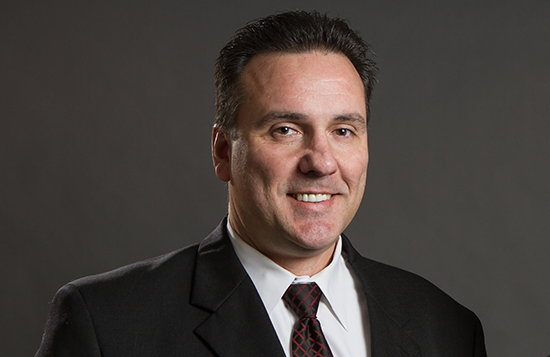
Photo: Troy Sadowski today.
Troy is also enjoying life with his wife Beth, whom he describes as the greatest friend and accountability partner a man could have. He remembers talking to a neighbor in his driveway when a beautiful lady drove by on a golf cart. “I asked him, ‘Wow! Who’s that?’” A few minutes later, she drove back by…with seven kids on the cart. Thankfully, only one of them was hers.
Before long, the two found themselves on a three-and-a-half hour first date, enjoying hot wings. A little over a year later, they were married. She may be nearly a foot shorter than her NFL husband, but she’s perfect for him, according to Troy. “She is an incredible, godly woman who stands behind me and supports me. I have lots of friends, but she is my best friend.”
As he looks back over his life so far, Troy is grateful for second chances, but he also struggles with regret. “I just wish I had listened to Coach Cagle way back in high school. Who could I have influenced? What impact could I have made for God? The truth is, I’m embarrassed by the person I used to be. But by God’s grace, I am going to finish strong!”
About the Writer: Eric K. Thomsen is managing editor of ONE Magazine. Learn more about Free Will Baptist Foundation and Cornerstone Estate Planning: www.FWBGifts.org or 877-336-7575.
Troy's advice for amateur athletes seeking a pro career?
“If it’s football, grab a tennis racket or a set of golf clubs. Seriously, the number of players who move up the chain from high school to college to the pros is very small. Don’t get me wrong: pursue your dream, but have a backup plan. Get a legitimate degree. Understand there is more to life than just sports. Listen to your parents and take school seriously. You will never regret it!”
|
|

